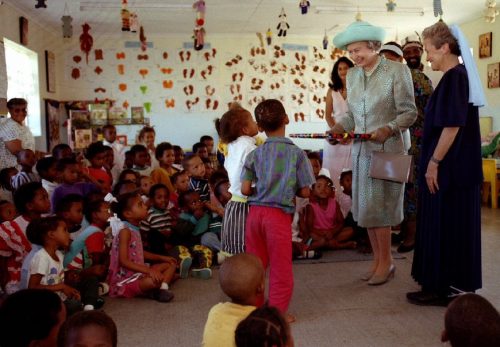By Ngala Killian Chimtom | Catholic News Service
YAOUNDÉ, Cameroon (CNS) — Many Africans, including bishops, mourned the death of Britain’s Queen Elizabeth, but for some, that feeling of grief was dwarfed by memories of Britain’s colonial exploitation of the continent.
And while Queen Elizabeth lived through an era of industrialization that is responsible for the current climate crisis, some hope her successor, King Charles III, could be part of the solution.
Bishop Matthew Hassan Kukah of Sokoto, Nigeria, described the late queen as “a moral force in a world that has become severely fractured by hatred and other forms of extremism.”
Bishop Sithembele Sipuka of Umtata, president of the Southern African Catholic Bishops’ Conference, told Catholic News Service that Elizabeth was “a source of cohesion and identity for her people.”
And Father Humphrey Tatah Mbuy, communications director of the Cameroonian bishops’ conference, described the late queen as “a beautiful, gentle lady.”

But Bishop Sipuka noted that “colonization is something that should have never happened in the first place, because it was an oppressive system to the locals and led to robbery of resources and brains.”
Elizabeth came to power toward the end of colonization, but Bishop Sipuka said he believes she could have done something about British involvement in colonialism.
“While she didn’t invent colonization … I think that she should have done more to mitigate the damage of British colonialism and give her moral support to efforts of asserting the cultural, linguistic and economic independence of former colonized countries,” Bishop Sipuka told CNS.
“Unfortunately, other forms of colonialism have developed under her watch and, given her moral authority, I think that she could have used her influence against the continued colonization of Africa in its many shades.”
The cleric cited the case of Zimbabwe, which continues to reel from economic and political uncertainties as a direct result of “the manner in which Britain handled the post-independence developments in that country.”
Bishop Kukah noted that British influence in Africa was deep — from the imposition of colonial domination to its hurried end in the 1960s.
He recalled that when Barbados declared itself a republic, Prince Charles — now King Charles — “attended the ceremony and, at that event, he talked about ‘the darkest days of our past, and the appalling atrocity of slavery, which forever stains our history.'”
The bishop said that statement marked a “historic admission of the evils of colonialism” and expressed optimism that Charles could begin to create the kind of atmosphere that helps right the wrongs of colonialism. But it may depend on the attitude of African leaders, he added.
“This historic admission of the evils of colonialism suggest that the future is in the hands of African leaders, whether they can move from their humiliating, servile, depressing, suffocating, boot-licking and treacherous subservience to Western interests to focusing in the dehumanizing conditions of their people,” Bishop Sipuka told CNS.
Looking to the reign of King Charles and the environmental crisis facing Africa and the world, Bishop Kukah told CNS, “I believe that given what he already knows, King Charles could become a worthy interlocutor, helping African leaders to address the crisis of the environment with greater urgency.”
Cardinal Wilfrid F. Napier, retired archbishop of Durban, South Africa, said Charles, who spent decades campaigning, cajoling and convening meetings to drive action on environmental issues, isn’t likely to cool off, even if the demands of monarchy require him to be politically neutral.
“Prince Charles is an elderly man of 73 years, so I don’t think anyone would expect him to change course very much from what he has been doing — for instance, a lot of work in the conservation of nature. I think King Charles is going to be a front-runner in that kind of activity, and I really encourage him to do so, because we need someone who is going to take a high moral ground in regard to conservation of nature and the environment.”
King Charles took interest in issues such as tropical forests, ocean depths, sustainable farming practices and water security even before the issues became mainstream political issues.






















